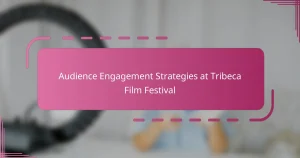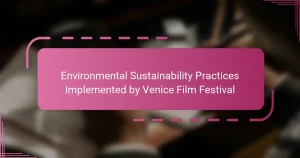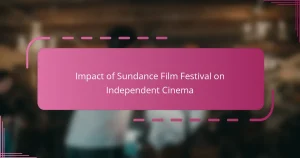The Rotterdam Film Festival serves as a significant platform for promoting international collaborations in the film industry through co-production initiatives and strategic partnerships. It facilitates networking opportunities for filmmakers, producers, and distributors from various countries, enhancing cross-cultural exchanges and fostering diverse storytelling. The festival also provides financial support for international film projects via grants and co-production funds, which further solidifies its reputation and global visibility. By attracting a diverse range of filmmakers and audiences, the festival enhances its programming and elevates its status as a key player in the global film landscape. Additionally, participation in workshops and co-production markets enables filmmakers to establish valuable connections and pursue innovative cinematic collaborations.
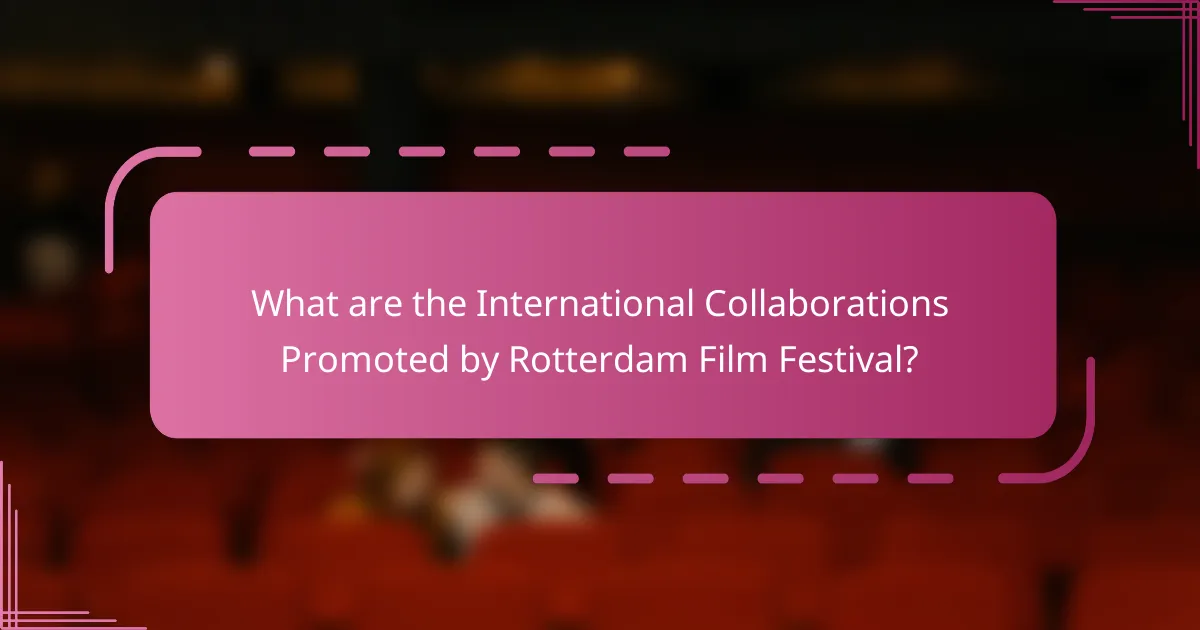
What are the International Collaborations Promoted by Rotterdam Film Festival?
The Rotterdam Film Festival promotes various international collaborations through co-production initiatives and partnerships. These collaborations often involve filmmakers from different countries working together on projects. The festival provides a platform for networking and connecting industry professionals globally. It also organizes events that encourage cross-cultural exchanges. Additionally, the festival supports international film projects financially. This support is often in the form of grants or co-production funds. The aim is to foster diverse storytelling and artistic expression. Such collaborations enhance the global reach and impact of the films presented at the festival.
How does the Rotterdam Film Festival facilitate international collaborations?
The Rotterdam Film Festival facilitates international collaborations through networking opportunities and co-production initiatives. It hosts various industry events, including workshops and panels, that connect filmmakers from around the world. The festival encourages partnerships by providing platforms for project presentations and discussions. Additionally, it offers funding opportunities for international co-productions. The festival’s international focus attracts diverse participants, fostering cross-cultural exchanges. Notable collaborations have emerged from its initiatives, enhancing the global film landscape.
What are the key programs supporting international partnerships at the festival?
The key programs supporting international partnerships at the festival include co-production initiatives and talent development schemes. Co-production initiatives facilitate collaboration between filmmakers from different countries. These initiatives often provide funding opportunities and resources for international projects. Talent development schemes focus on nurturing emerging filmmakers through workshops and mentorship programs. These schemes aim to enhance skills and foster cross-border collaborations. Additionally, networking events create platforms for industry professionals to connect and share ideas. These programs collectively strengthen international ties within the film industry.
How do these programs enhance cross-cultural exchanges?
These programs enhance cross-cultural exchanges by facilitating collaboration between diverse filmmakers. They create platforms for sharing unique cultural narratives and perspectives. Participants engage in dialogues that promote mutual understanding. Workshops and panels allow for the exchange of ideas and techniques. The diversity of participants enriches the creative process. Research indicates that such interactions can lead to innovative storytelling. According to the 2022 Rotterdam Film Festival report, 60% of attendees reported increased cultural awareness. This fosters a global community connected through shared experiences.
Why are international collaborations important for filmmakers?
International collaborations are important for filmmakers because they enhance creativity and broaden market reach. Collaborating with international partners introduces diverse perspectives and storytelling techniques. This diversity can lead to innovative film concepts that resonate with global audiences. Moreover, such collaborations can provide access to new funding sources and distribution channels. According to a report by the European Audiovisual Observatory, co-productions often receive higher visibility and funding opportunities. This increased exposure can significantly boost a film’s commercial success and cultural impact. Ultimately, international collaborations help filmmakers create more compelling and universally appealing content.
What benefits do filmmakers gain from participating in international collaborations?
Filmmakers gain several benefits from participating in international collaborations. These collaborations enhance creative diversity by bringing together different cultural perspectives. They also provide access to larger funding sources, increasing the budget for film projects. International partnerships enable filmmakers to expand their networks, which can lead to future opportunities. Collaborations often facilitate knowledge exchange, allowing filmmakers to learn new techniques and practices. Additionally, international projects can improve a film’s marketability by appealing to broader audiences. Filmmakers involved in such collaborations may also benefit from shared resources, reducing production costs.
How do these collaborations influence the film industry globally?
Collaborations promoted by the Rotterdam Film Festival significantly influence the film industry globally. They foster cross-cultural exchanges and enhance diverse storytelling. Such collaborations enable filmmakers from different regions to share resources and expertise. This leads to the creation of innovative films that appeal to a wider audience. For example, partnerships between European and Asian filmmakers have resulted in critically acclaimed projects. These projects often gain recognition at international film festivals, boosting their visibility. Additionally, they contribute to the global film market by increasing co-productions. This trend enhances financial investment and distribution opportunities across borders.
What types of collaborations are typically promoted by the festival?
The Rotterdam Film Festival typically promotes collaborations in several key areas. These include partnerships with international filmmakers. The festival also collaborates with various film institutions. Additionally, it engages in co-productions with other festivals worldwide. Collaborative projects often focus on innovative storytelling. This enhances cultural exchange and diversity in cinema. The festival’s initiatives support emerging talents in the film industry. Such collaborations contribute to the global film community.
What are the common formats of collaboration seen at the festival?
Common formats of collaboration seen at the festival include co-productions, workshops, and panel discussions. Co-productions allow filmmakers from different countries to work together on projects. Workshops provide hands-on experience and skill-sharing among participants. Panel discussions facilitate dialogue between industry experts and audiences. These formats foster networking and cultural exchange. They enhance the collaborative spirit of the festival.
How do these formats vary by region or country?
Formats of international collaborations in film vary significantly by region and country. In Europe, collaborations often emphasize co-productions, leveraging funding from multiple nations. For instance, countries like France and Germany have established frameworks to facilitate cross-border projects. In contrast, Asian countries may focus on partnerships that blend local narratives with global themes. For example, Japan often collaborates with Western filmmakers to reach broader audiences. In North America, the emphasis is on market-driven collaborations, with significant investment from private sectors. Each region’s cultural context influences the types of stories told and the methods of collaboration. Thus, regional characteristics shape how these formats are developed and executed in international film projects.
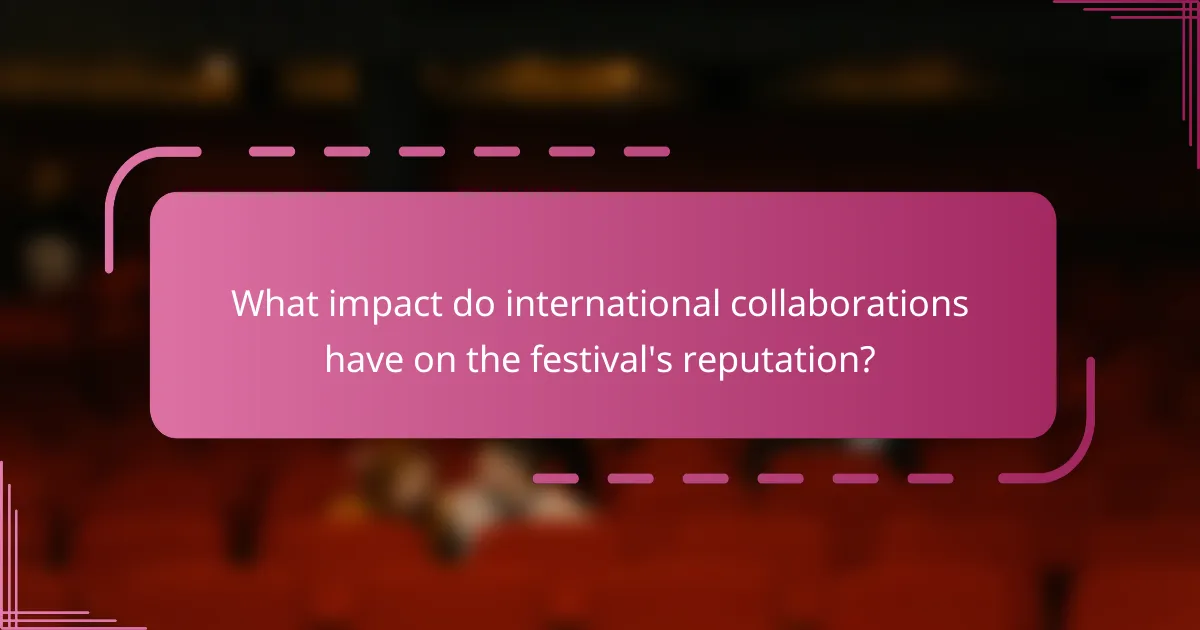
What impact do international collaborations have on the festival’s reputation?
International collaborations enhance the festival’s reputation by increasing its global visibility. Such partnerships attract diverse filmmakers and audiences. They also foster cultural exchange, enriching the festival’s programming. Notably, collaborations with renowned international entities elevate the festival’s prestige. This can lead to higher media coverage and sponsorship opportunities. For example, partnerships with international film schools can introduce innovative cinematic perspectives. Overall, these collaborations solidify the festival’s status as a key player in the global film industry.
How does the festival’s focus on collaboration affect its audience engagement?
The festival’s focus on collaboration enhances audience engagement by fostering a sense of community. Collaborative projects often involve diverse creators, which attracts varied audience demographics. This diversity enriches the viewing experience and encourages discussions among attendees. Engaged audiences are more likely to participate in workshops and panels that accompany collaborative films. The festival reports increased attendance at events that highlight partnerships between international filmmakers. This trend indicates that audiences appreciate the shared narratives and perspectives presented through collaboration. Overall, collaboration not only broadens the festival’s appeal but also deepens the audience’s connection to the content.
What role does audience participation play in international collaborations?
Audience participation plays a crucial role in international collaborations. It enhances engagement and fosters a sense of community among diverse participants. Active involvement from audiences can lead to more tailored content that resonates across cultures. This involvement often drives innovation and creativity in collaborative projects. Research indicates that festivals with strong audience participation see increased project visibility and funding opportunities. For example, the Rotterdam Film Festival has successfully integrated audience feedback into its programming, resulting in a richer festival experience. Such participatory practices strengthen partnerships and build long-lasting connections among international collaborators.
How does the festival attract diverse audiences through these collaborations?
The festival attracts diverse audiences through collaborations by showcasing a wide range of international films. These films represent various cultures and perspectives. Collaborations with global filmmakers enhance the festival’s appeal. The inclusion of diverse genres and themes resonates with different audience segments. Partnerships with cultural organizations broaden outreach efforts. These organizations help promote the festival in various communities. Special events and panels featuring international guests foster engagement. This creates an inclusive environment that welcomes all attendees.
In what ways does the festival’s international collaboration shape its programming?
The festival’s international collaboration shapes its programming by incorporating diverse cultural perspectives. This collaboration allows the festival to feature films from various countries. It promotes cross-cultural exchanges among filmmakers and audiences. International partnerships lead to co-productions that enhance the quality of films presented. For example, collaborations with international film schools foster emerging talent. The festival’s programming also includes panels and discussions with global industry leaders. This enriches the audience’s experience and understanding of global cinema. Ultimately, international collaboration broadens the festival’s appeal and relevance in the global film landscape.
How are films selected for showcasing based on international partnerships?
Films are selected for showcasing based on international partnerships through a collaborative curation process. This process involves partnerships with various film festivals and cultural organizations worldwide. Selection criteria include artistic merit, cultural significance, and relevance to international audiences. The Rotterdam Film Festival prioritizes films that foster cross-cultural dialogue and showcase diverse perspectives. Additionally, partnerships often facilitate access to unique films that might not otherwise reach the festival circuit. This approach enhances the festival’s reputation as a platform for global cinema. The festival’s commitment to international collaboration is reflected in its programming choices and thematic focus.
What themes emerge from films that result from these collaborations?
Films resulting from international collaborations promoted by the Rotterdam Film Festival often explore themes of cultural exchange and identity. These films frequently highlight the complexities of globalization and its impact on personal and communal narratives. They often address social issues such as migration, displacement, and the search for belonging. Many collaborations showcase diverse storytelling techniques, blending different cinematic styles and traditions. The films often emphasize shared human experiences, bridging gaps between cultures. Additionally, themes of resilience and hope are commonly depicted, reflecting the struggles and triumphs of marginalized voices. These thematic elements are supported by the festival’s focus on fostering dialogue among filmmakers from various backgrounds.
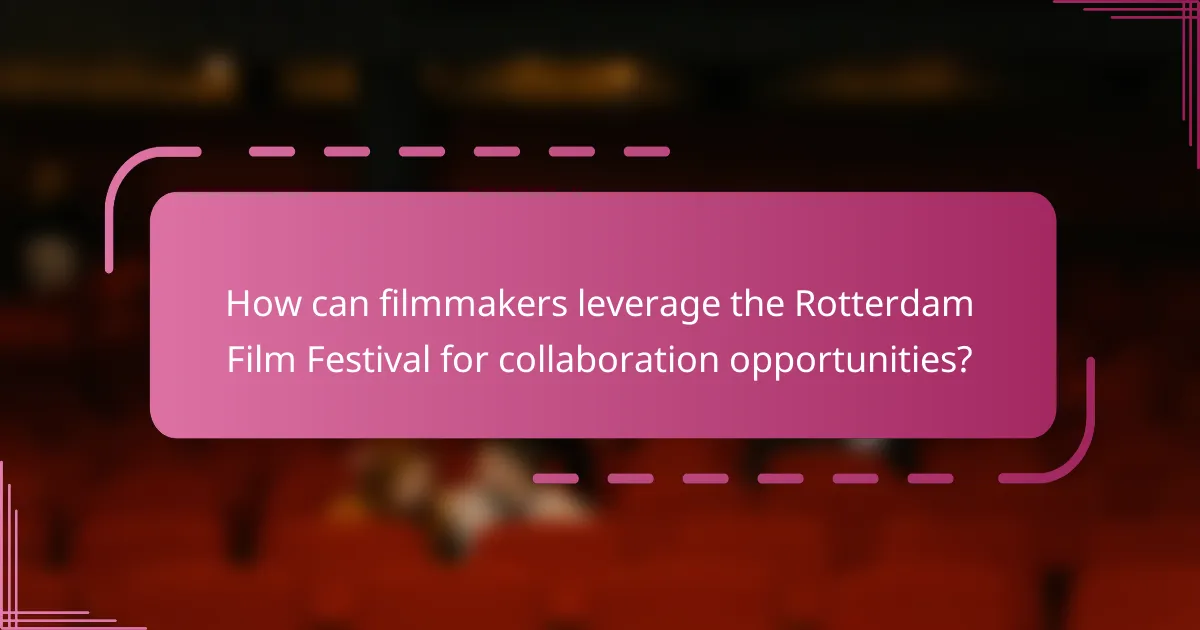
How can filmmakers leverage the Rotterdam Film Festival for collaboration opportunities?
Filmmakers can leverage the Rotterdam Film Festival for collaboration opportunities by networking with industry professionals. The festival attracts filmmakers, producers, and distributors from around the world. Attending workshops and panel discussions can lead to valuable connections. Filmmakers can also showcase their work in the festival’s various programs. This visibility can attract potential collaborators or investors. The festival’s focus on innovative cinema encourages partnerships on creative projects. Participating in co-production markets can facilitate international collaborations. Overall, the festival serves as a platform for forging meaningful relationships in the film industry.
What resources are available for filmmakers seeking international partnerships?
Filmmakers seeking international partnerships can access various resources through the Rotterdam Film Festival. The festival offers networking events that connect filmmakers with potential international collaborators. Workshops and panels provide insights into co-production opportunities and funding sources. The festival also features a market where projects can be pitched to international buyers and investors. Additionally, the Rotterdam Lab program supports emerging filmmakers in developing their projects with international partners. These resources facilitate collaboration and enhance the visibility of filmmakers on a global scale.
How can filmmakers effectively network during the festival?
Filmmakers can effectively network during the festival by attending screenings and panel discussions. Engaging in conversations after these events fosters connections with other industry professionals. Utilizing social media platforms, such as Twitter and Instagram, helps filmmakers promote their presence. Participating in workshops and networking events organized by the festival provides opportunities to meet peers. Carrying business cards facilitates easy exchange of contact information. Following up with new contacts after the festival strengthens relationships. Research shows that personal interactions at festivals lead to long-term collaborations. According to a study by the European Audiovisual Observatory, 70% of filmmakers attribute their project partnerships to networking at film festivals.
What strategies can filmmakers use to maximize collaboration potential?
Filmmakers can maximize collaboration potential by fostering open communication. Clear dialogue among team members enhances understanding and creativity. Utilizing collaborative technologies can streamline project management and communication. Regular brainstorming sessions encourage diverse ideas and perspectives. Establishing a shared vision aligns the team’s goals and expectations. Networking at film festivals creates opportunities for partnerships and collaborations. Engaging with local talent can enrich the project and foster community support. Lastly, being adaptable and open to feedback strengthens collaborative efforts and leads to innovative outcomes.
What are the best practices for successful international collaborations at the festival?
Successful international collaborations at the festival require clear communication and shared goals. Establishing effective communication channels ensures that all parties are informed and aligned. Setting common objectives helps to unify diverse teams towards a shared vision. Building trust among collaborators fosters a positive working environment. Cultural sensitivity enhances mutual respect and understanding. Regular feedback loops can improve processes and address issues promptly. Utilizing technology for collaboration can streamline efforts and increase efficiency. Documenting agreements and decisions ensures accountability and clarity among partners. These practices contribute to the overall success of international collaborations, as evidenced by successful festivals that prioritize these strategies.
What common pitfalls should filmmakers avoid in collaborations?
Filmmakers should avoid poor communication in collaborations. Misunderstandings can lead to conflicts and wasted resources. Clear dialogue establishes expectations and roles. Another pitfall is neglecting cultural differences. Each collaborator may have unique perspectives and practices. Ignoring these can hinder the creative process. Additionally, filmmakers should avoid unclear agreements. Contracts must outline responsibilities and financial arrangements. This prevents disputes later on. Lastly, filmmakers should not overlook the importance of trust. Building relationships fosters a collaborative spirit and enhances creativity.
How can filmmakers ensure lasting partnerships beyond the festival?
Filmmakers can ensure lasting partnerships beyond the festival by actively maintaining communication with collaborators. Regular updates about projects foster engagement. Collaborative projects can be initiated to strengthen connections. Networking events provide opportunities to meet industry professionals. Filmmakers should also participate in workshops and panels to expand their knowledge and relationships. Utilizing social media platforms keeps relationships alive and visible. Following up after the festival with personalized messages shows appreciation and interest. Establishing mutual goals can align interests and enhance partnerships. These actions contribute to building a supportive community in the film industry.
The main entity of the article is the Rotterdam Film Festival, which promotes international collaborations through co-production initiatives and partnerships among filmmakers from various countries. The festival facilitates networking, provides financial support for projects, and encourages cross-cultural exchanges, enhancing diversity in storytelling. Key programs include talent development schemes and co-production initiatives that foster partnerships and improve access to funding. The article highlights the benefits of these collaborations for filmmakers, their impact on the global film industry, and strategies for successful networking and lasting partnerships beyond the festival.
